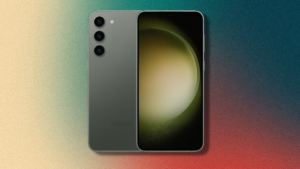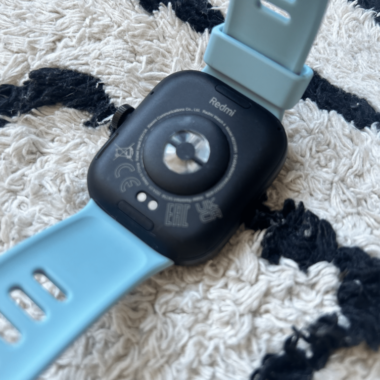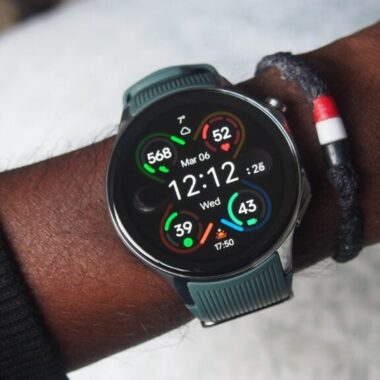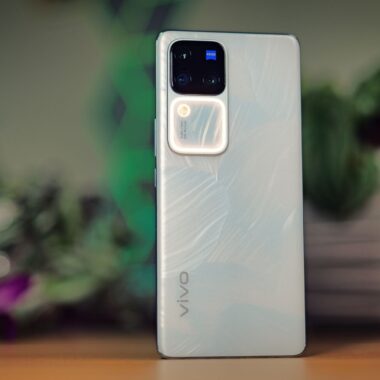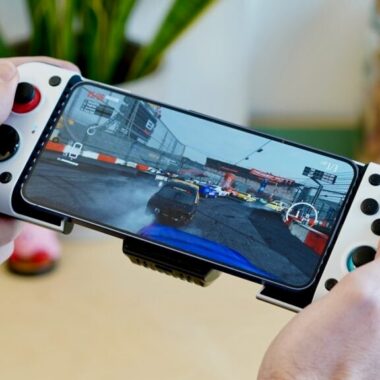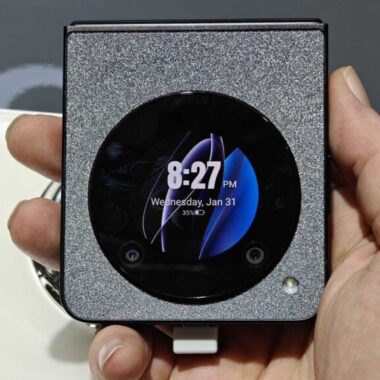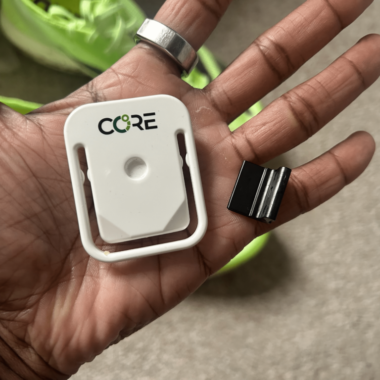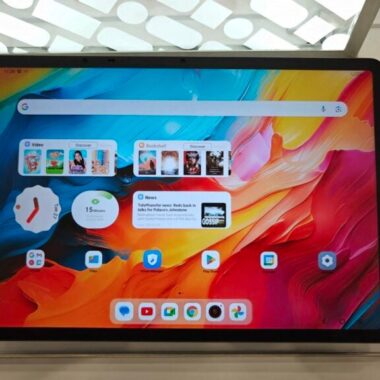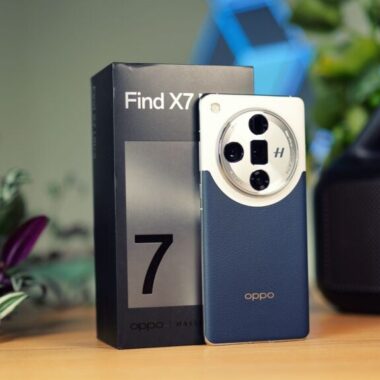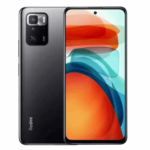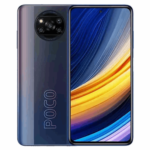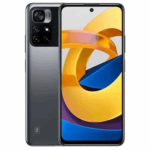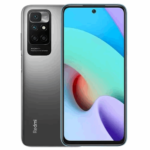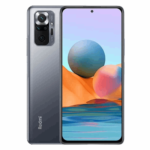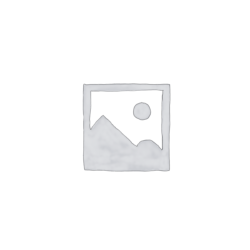Verdict
Don’t buy the Samsung Galaxy Tab S9 FE if you want the most power you can get for your money. However, it’s ideal for time-wasting, video streaming and dabbling in digital artwork as it includes a good S-Pen stylus.
Pros
- Good-looking design
- Includes a great S-Pen stylus
- Borderline overkill water resistance
Cons
- Relatively weak processor
- The non-FE tablets have deeper blacks
- No headphone socket
-
IP68 water resistanceThis tablet has terrific water resistance, letting it handle being fully submerged in water. Why would that even happen? -
microSD supportYou can insert a microSD card in the SIM-style slot so you are not left with the default storage for good. -
Optional 5G Samsung makes Wi-Fi only and 5G versions of the Tab S9 FE, and you can use either a physical SIM or an eSIM. Or both.
Introduction
The Samsung Galaxy Tab S9 FE is a mid-table tablet, and the antidote to the alarming reality of quite how expensive some Android tablet are these days.
You can pay up to £1699 for the Galaxy Tab S9 Ultra. Wild, right? The Samsung Galaxy Tab S9 FE starts at £449, and there’s a “Plus” version with a bigger screen that starts at £599.
Sure, this isn’t a cheap tablet, but it is a direct rival to the most affordable iPads. It ends up slightly cheaper than those too, as the Samsung Galaxy Tab S9 FE includes a pressure-sensitive stylus.
There’s nothing too dynamic going on here, and both the cheaper iPads and OnePlus’s Pad are a lot more powerful. However, this is a nice tidy step up from the Galaxy Tab S6 Lite in performance and screen quality, particularly for those who have an interest in using a tablet as a digital sketchbook.
Design
- Gorilla Glass 5 screen protection
- Aluminium casing
- 254.3 x 165.8 x 6.5 mm, 523g
The Samsung Galaxy Tab S9 FE is an example of a typical tablet design: It’s just a big screen with an aluminium jacket. And in this case, the jacket is squared off rather than having rounded corners.
It looks very similar to the more expensive “non-FE” Galaxy Tab S9, with just slightly thicker screen borders. The two lines share the same footprint dimensions, but the Tab S9 has an 11-inch screen to this one’s 10.9-inch one.
It’s slightly thicker too, but at 6.5mm you’re not going to catch me complaining about the Samsung Galaxy Tab S9 FE’s thickness.
Much like the FE phones, while this tablet isn’t quite as slick as the true top-tier models, it’s not far off.
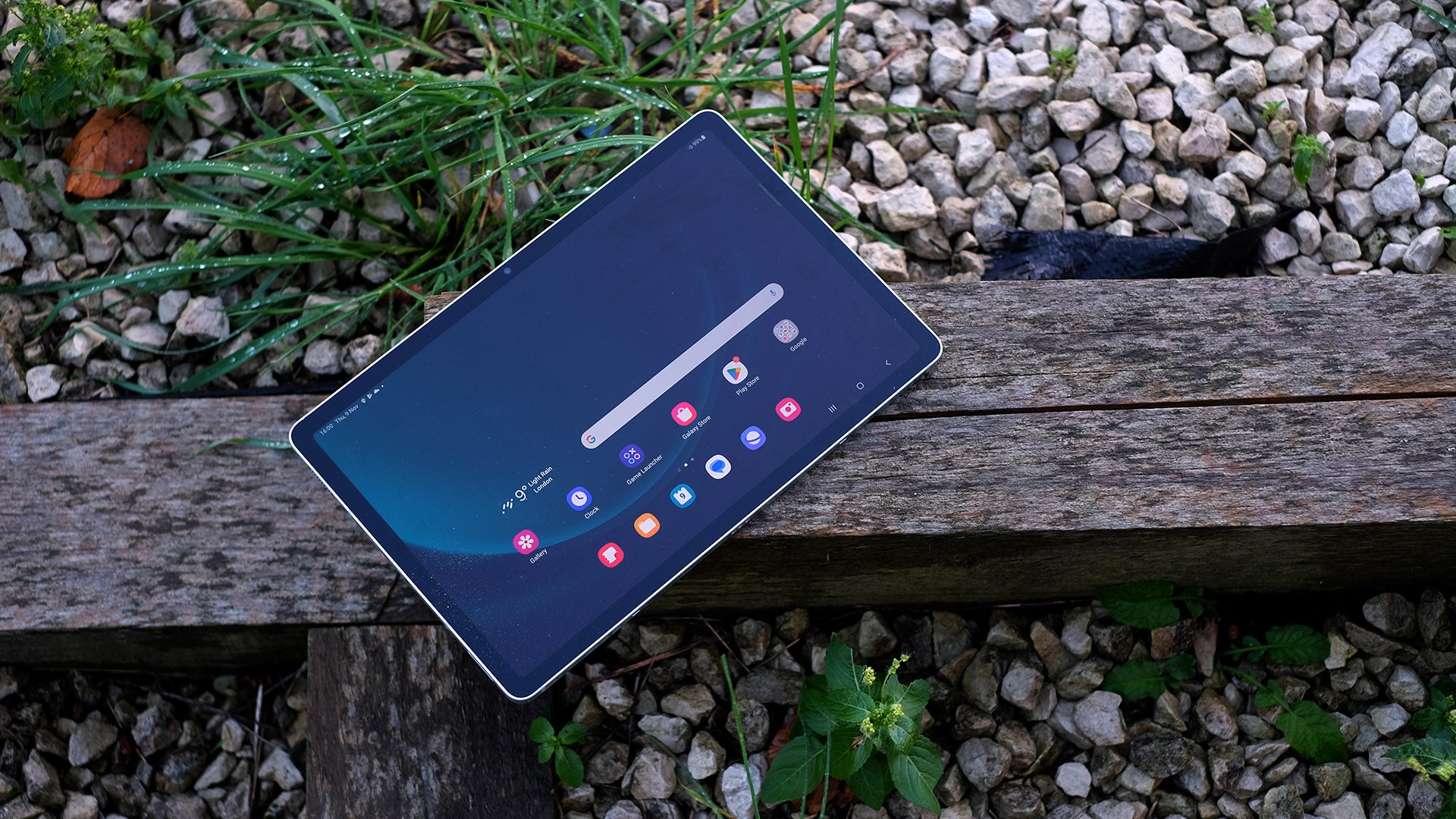
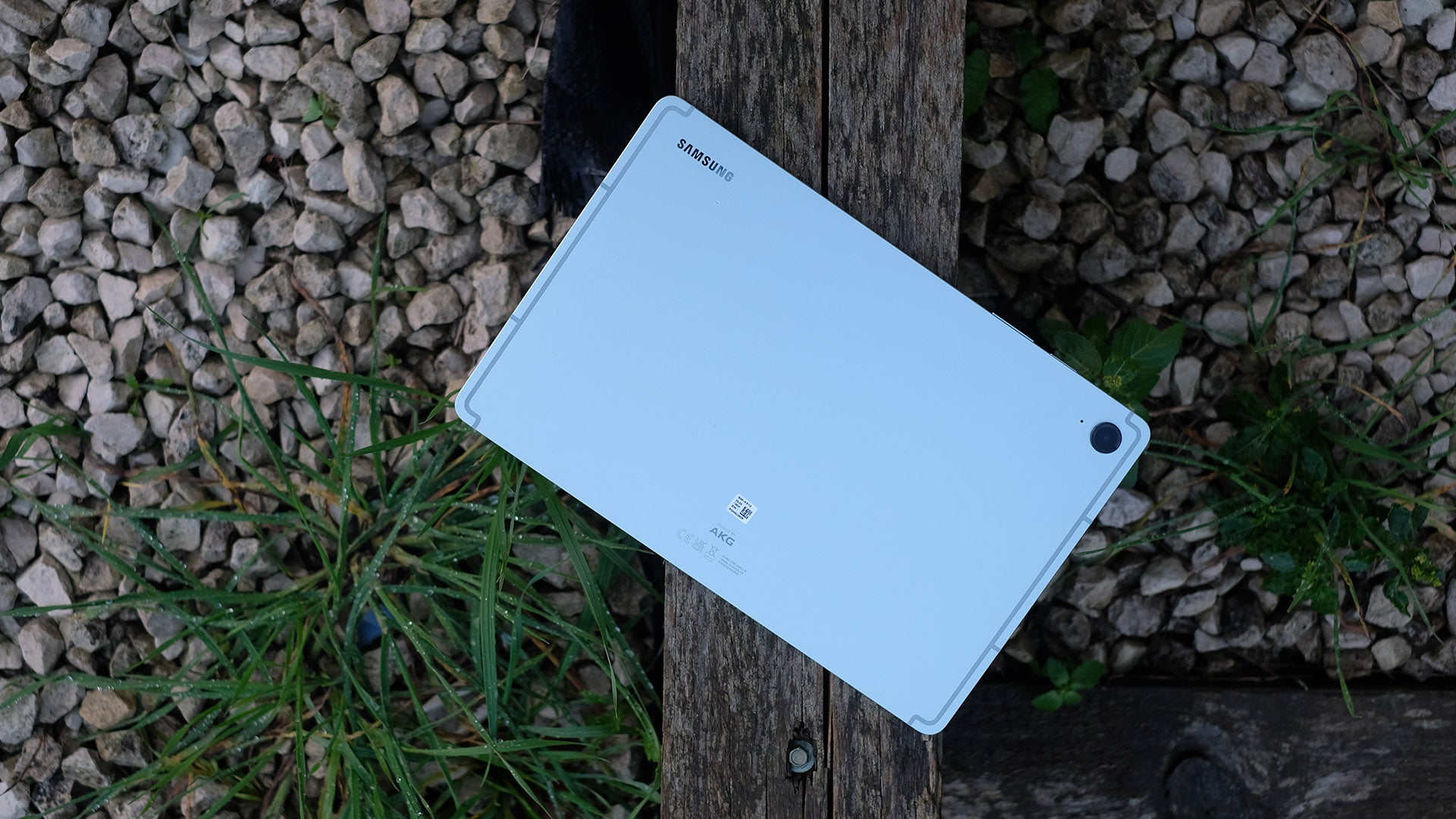
The Samsung Galaxy Tab S9 FE also lacks the rear grooves the more expensive Samsung tablets have which show where the stylus sits. But this arguably only makes the FE look better and cleaner, and there are still magnets in the back for the pen to hook onto.
This tablet is what I consider to be an ideal size for classic tablet time-wasting. It’s miles bigger than any phone, but doesn’t have the sheer bulk of a 12-inch-plus tablet. And if that’s what you want, the Samsung Galaxy Tab S9 FE Plus is right there waiting.
The Samsung Galaxy Tab S9 FE also has ridiculously good water resistance for a tablet, which typically aren’t subjected to the elements as often as a phone. It’s rated at IP68, ready for submersion in “up to 1.5 meters of freshwater for up to 30 minutes.”
This tablet also has a side-mounted fingerprint sensor. Samsung’s higher-end models use an in-screen one, seen as flashier, but plenty of people will prefer a side button anyway. It’s not as intuitively placed or as fast as the best phone finger scanners, but seems to work just fine.
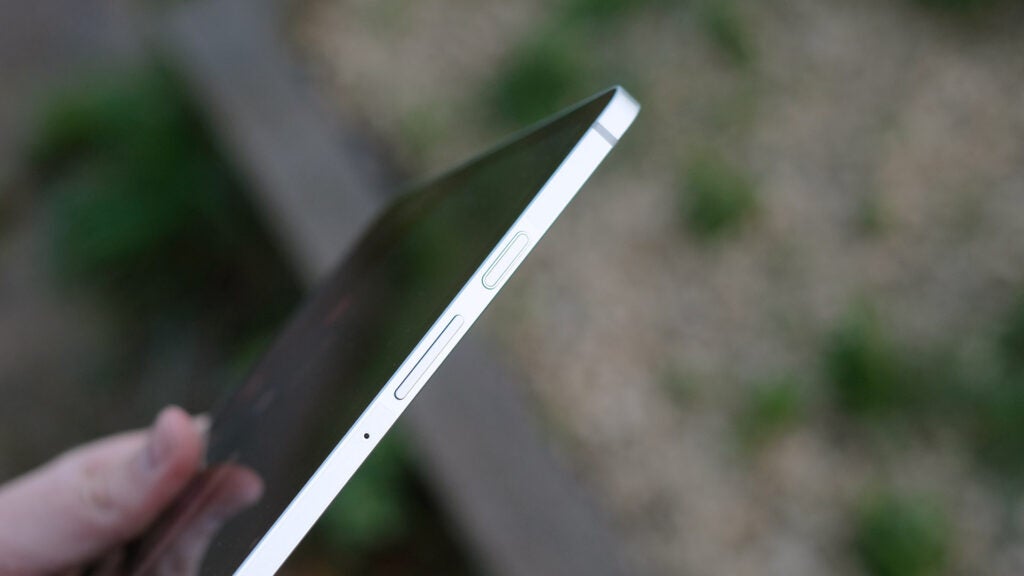
Samsung also earns bonus points for including a microSD slot as part of a pop-out tray. This is used for the SIM card in the 5G version, but I’m using a Wi-Fi-only model. That 5G one supports dual SIM operation too, although that’s through one physical SIM, one eSIM. There’s no headphone jack, which, as ever, is annoying in a tablet.
Look at the long side opposite the finger sensor and you’ll see the connectors that hook up to Samsung’s keyboard accessory. There’s one with just a keyboard for £159, or a keyboard and touchpad for £199.
When connected, the Samsung Galaxy Tab S9 FE will switch over to its more PC-like Dex interface. But I don’t have this keyboard and, at almost half the cost of the tablet itself, they do seem quite pricey as a way to turn this into a pretty limited laptop.
Screen
- 90Hz refresh rate
- 670-nit brightness
- 2304 x 1440 pixel LCD panel
The Samsung Galaxy Tab S9 FE has a 10.9-inch screen. This doesn’t use one of Samsung’s signature OLED panels, just a 90Hz LCD.
You might not guess this at first glance, though, because the Samsung Galaxy Tab S9 FE’s colour pops just as much as that of the average tablet or phone OLED screen. Those bright app icons look super-saturated, which was the first thing I noticed.
That this is an LCD does become much clearer at night, though. It uses a standard universal backlight, so the black floor can only reach so low. You can really tell it has an LCD at an extreme angle too, where the backlight makes the screen appear to turn a blue-grey.
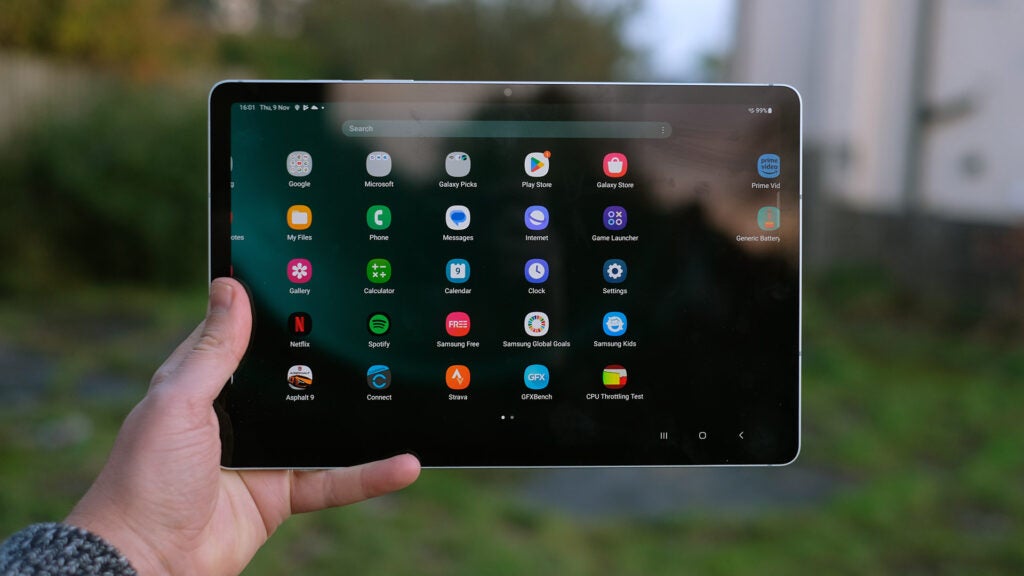
However, outside of a dark or dimly lit room I don’t think this is visibly much worse than Samsung’s higher-end displays. It also, crucially, uses a 1440p panel rather than a Full HD-style one. You have to look quite keenly to notice any significant pixellation.
It’s nice and bright, with maximum screen power of 670 nits. That sits between the dimmer Tab S9+ and the brighter Tab S9, according to Samsung’s figures.
This also means it sits somewhere between a laptop and a flagship phone in brightness.
The 90Hz refresh rate may also sound a bit low to some tech-heads and, sure enough, the non-FE models have 120Hz panels. However, it still provides smoother scrolling than a classic 60Hz panel and honestly didn’t stick out much in testing.
Accessories (S-Pen)
- 4096 pressure sensitivity levels
- Non-powered S-Pen
- Optional keyboard case accessories
As mentioned earlier, I haven’t been able to try the Samsung Galaxy Tab S9 FE’s keyboard cases. But every one of these tablets includes an S Pen stylus.
This is a full-size plastic pen with 4096 pressure sensitivity levels and tilt detection, which make it a pretty high-fidelity drawing tool.
Creating digital art or doodles with this thing feels great, and the S-Pen has a proper tip with a little give to it to avoid you simply sketching with a hard nib on hard glass.
The bundled stylus is not Samsung’s most advanced, though. To get Air Actions, where the stylus can be used as a remote control of sorts, you need an S Pen Pro. This one here an old-school smart stylus, one that does not require a battery and communicates with the Samsung Galaxy Tab S9 FE screen through its digitiser layer.
It’s my favourite kind, as you don’t have to worry about replacing batteries. Or built-in ones dying, as can easily happen to a fully-discharged Apple Pencil.
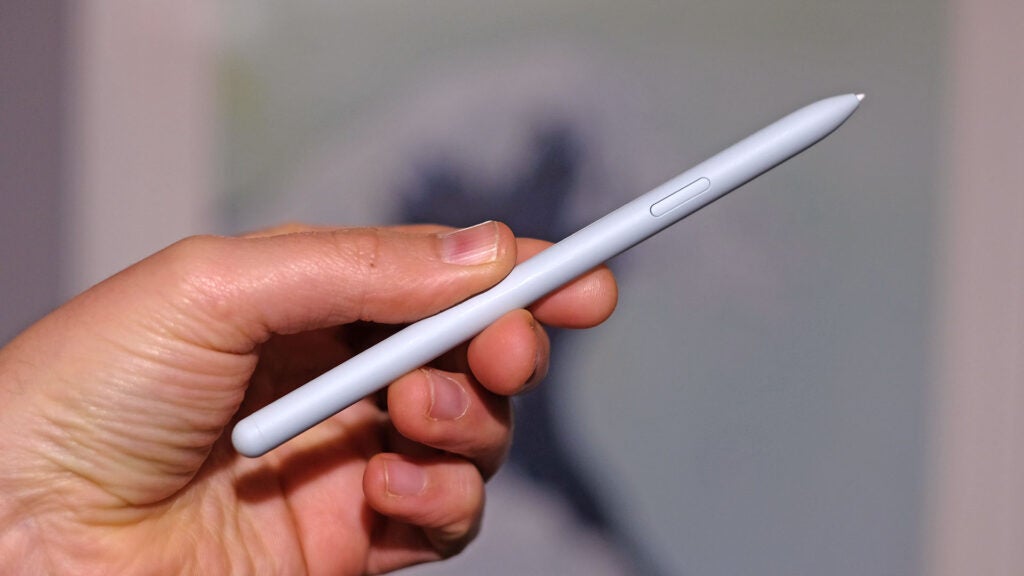
You’ll see the pen reticule when the tip hovers up to an inch away from the screen. And at that distance, pressing the button on the stylus’s barrel will bring up the Air Command menu of shortcuts you specify.
You can also use the S-Pen to write, an alternative to the virtual keyboard. Samsung uses OCR software to turn your scrawls into text.
There’s nothing new here, but Samsung’s S-Pens continue to be great, particularly on the creative side. As you can probably tell from the size of this stylus, though, the Samsung Galaxy Tab S9 FE does not offer a slot in which the pen can live.
Instead, a series of magnets can hold it in place on the case, nib pointing towards the camera. Or it can stick to either of the tablet’s long edges.
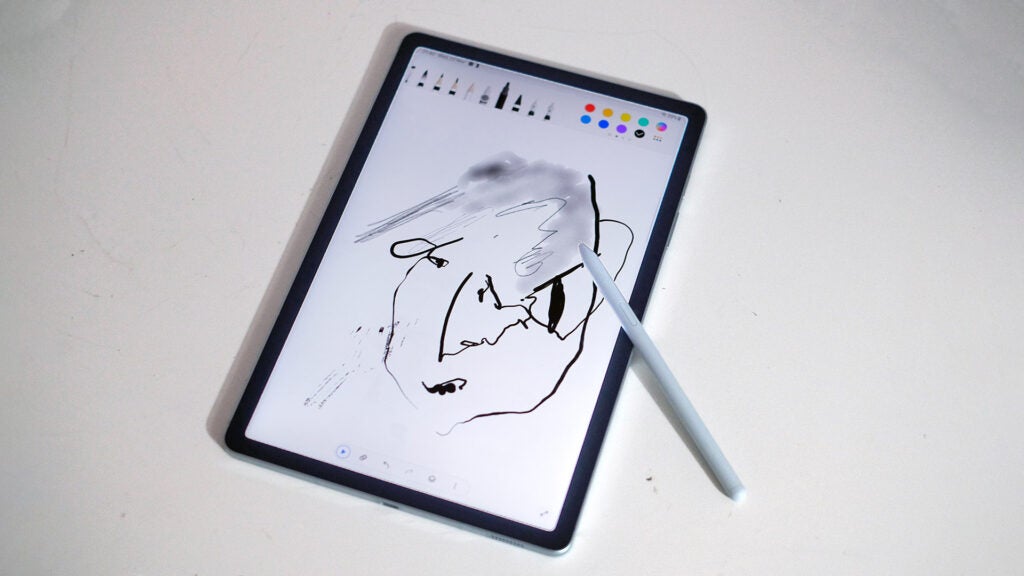
The bundled stylus significantly increases the appeal of the Samsung Galaxy Tab S9 FE. Without it, this tablet would get a slightly lower score. If you can afford the extra, I’d still recommend an iPad over this for creativity use as its selection of drawing, painting and music-making apps is superior to Android’s. But it isn’t at all bad.
Performance
- Not close to the base iPad or OnePlus Pad in raw power
- Samsung Exynos 1380 processor
- 6GB or 8GB RAM
The Samsung Galaxy Tab S9 FE has enough power for most jobs to which it is well-suited, but this is one of the weakest areas for the tablet.
It uses the Samsung Exynos 1380 chipset with either 6GB or 8GB RAM, depending on the spec you opt for. It’s not nearly as punchy as the Dimensity 9000 of the OnePlus Pad or the A13 Bionic of the cheapest iPad.
This plays out most starkly in GPU power, which I used 3D Mark’s suite of benchmarks to demonstrate. The Galaxy Tab S9 FE scores just 845 in the 3D Mark Wild Life Extreme test, compared to 2372 from a Dimensity 9000 device like the OnePlus Pad.
Those rivals have high-end processors, even if they aren’t the most glamorous or newest chipsets. The Galaxy Tab S9 FE’s CPU is a mid-ranger with far less graphics juice available. In fact, it’s the same as that within the Samsung Galaxy A54 5G.
It delivered enough grunt to play a tough game like Fortnite OK, but it doesn’t remotely get near to reaching a consistent 60fps with the maximum available graphics settings.
The CPU does also mean you get mid-tier responsiveness when flicking between apps rather than the more seamless feel of the top performers. As you’d hope for a tablet with this sort of power, though, the Samsung Galaxy Tab S9 FE never suffers from notable thermal throttling and doesn’t get particularly warm or hot.
It also has a capable stereo speaker array, with the drivers arranged to sit on either side of your head when the Samsung Galaxy Tab S9 FE is held landscape. Maximum volume and projection are both great, but unsurprisingly, bass power is a little limited compared to Samsung’s best quad-driver arrays. It’s not totally absent, though, and the sound is still strong enough for satisfying YouTube and gaming sessions.
Cameras
- Passable quality cameras
- Selfie camera has ultra-wide and standard views
The Samsung Galaxy Tab S9 FE has two cameras, an 8MP one on the back and a 12MP one upfront.
This front camera is the most interesting, as Samsung uses the higher resolution sensor to style it out as though the Tab has two cameras. There are standard and ultra-wide fields of view in the camera app, the more “zoomed in” view using a crop.
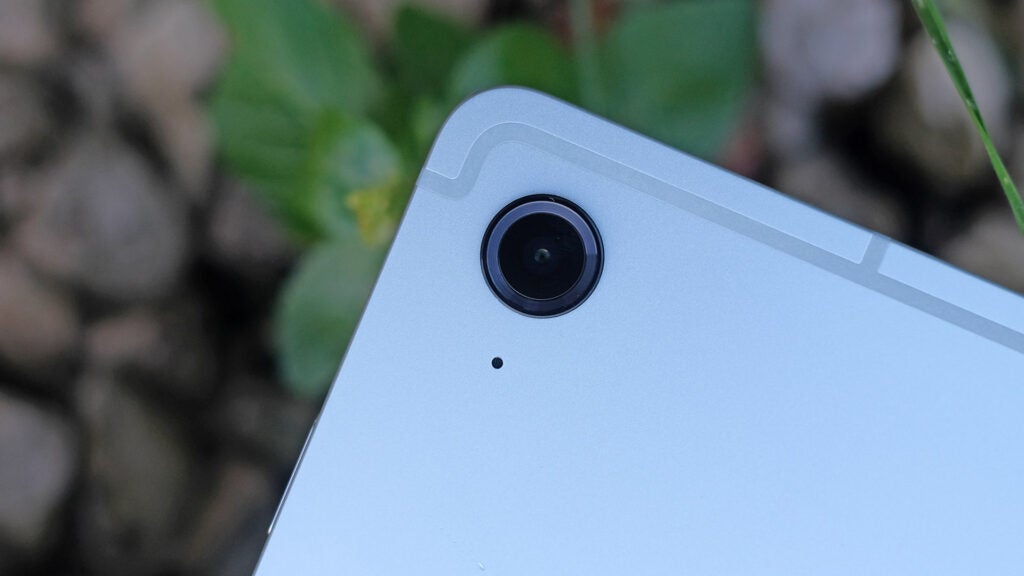
Neither of these cameras has particularly great hardware. The detail level of the rear camera is only moderate, and selfies look quite soft compared to those of a good 8MP phone selfie camera. And unlike the better phones close to this price (and some at half the price), its low-light images taken with the rear camera are poor.
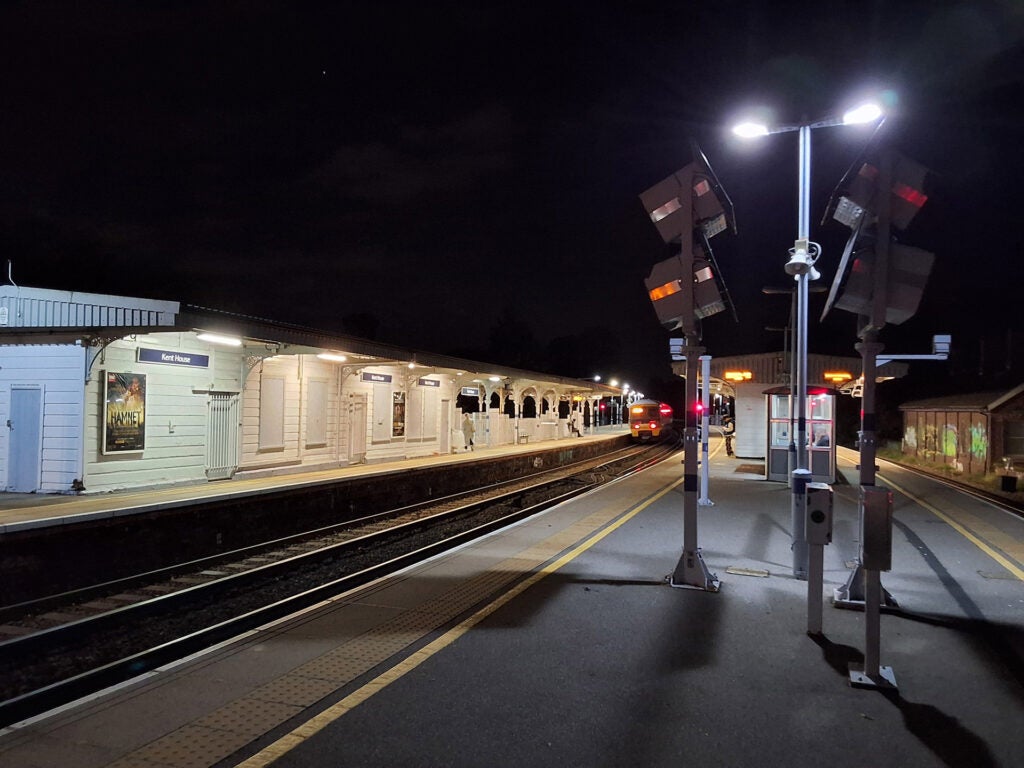
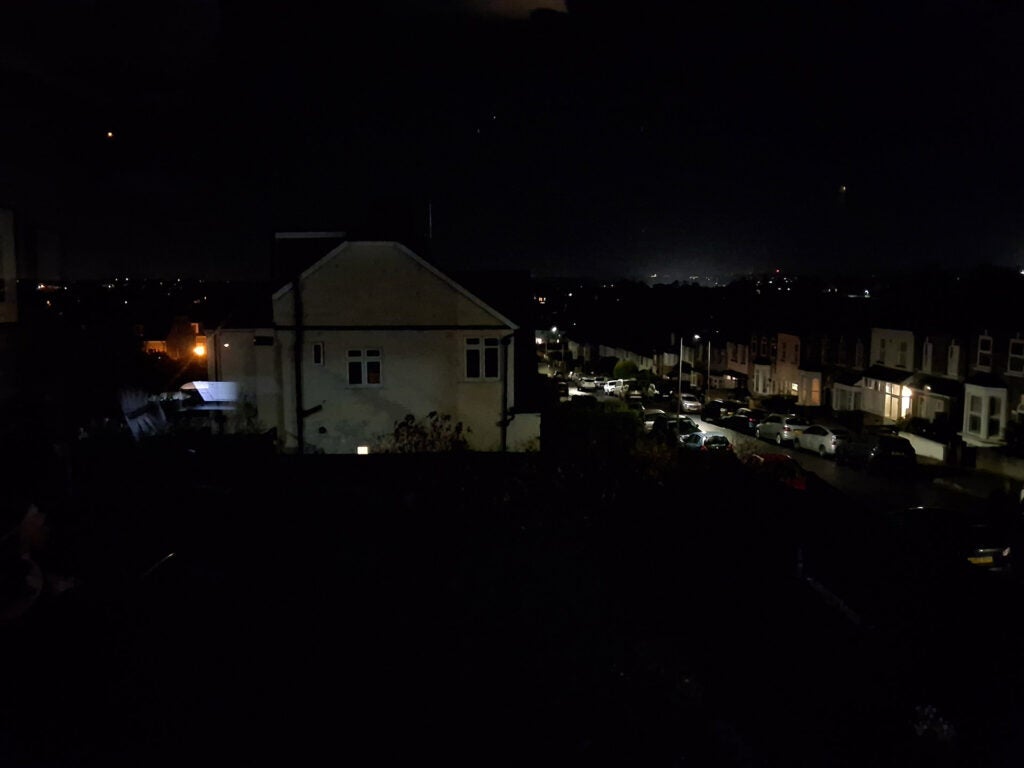
Consistent with what we see in stills, video capture is limited. It tops out at a lowly 1080p, 30 frames per second. The Samsung Galaxy Tab S9 FE has a pretty basic camera array, just as it should have. And, in case you’re wondering, the front camera is arranged so you’ll need to hold the tablet landscape to have it pointed directly at your face.
Software
- Android 13
- Has some tablet-specific interface optimisations
One criticism levelled at Android tablets, pretty much ever since they became a thing, is there is not enough tablet-specific optimisation. Folks say few apps tend to accommodate the bigger screen.
That still remains, but Samsung goes way beyond most other tablet makers in altering the navigation of the interface in tablets.
For example, even before you attach a keyboard, the Samsung Galaxy Tab S9 FE gets a more feature-packed dock area when you are within apps, with a more intricate array of app shortcuts and soft keys shunted off to one corner. It makes the Android interface a bit more like that of a PC than a tablet.
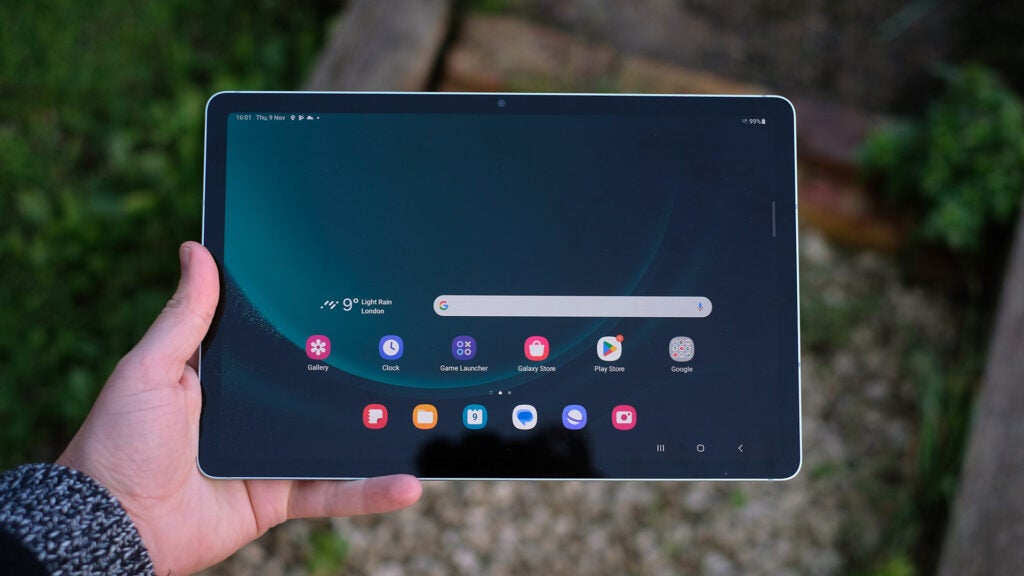
Under the surface, it’s the same old Android you know from phones. But there is at least a carefully considered millimetre-thick veneer here.
Samsung’s usual mountain of software comes preinstalled too, but PenUP is one of the few that feels relevant to this particular tablet. It’s a hobbyist drawing app that also functions as social network of sorts, letting you share your creations and react to those of other folks. There are live drawing videos too, so you can see how the maestros of digital art do it.
Or, on the more casual end, there are digital colouring-in patterns. However, as with almost every manufacturer-preinstalled app you should look for a better third-party alternative before long for drawing/painting.
Battery life
- Charging takes around 104 minutes
- 8000mAh capacity
The Samsung Galaxy Tab S9 FE has an 8000mAh battery, just a little lower than the capacity of the 8400mAh Tab S9.
It supports fast charging off up to 45W, just like that higher-end model, but in the usual Samsung fashion you don’t get one of these adapters in the box. I do have a compatible fast charger, though, so was able to test charging speed.
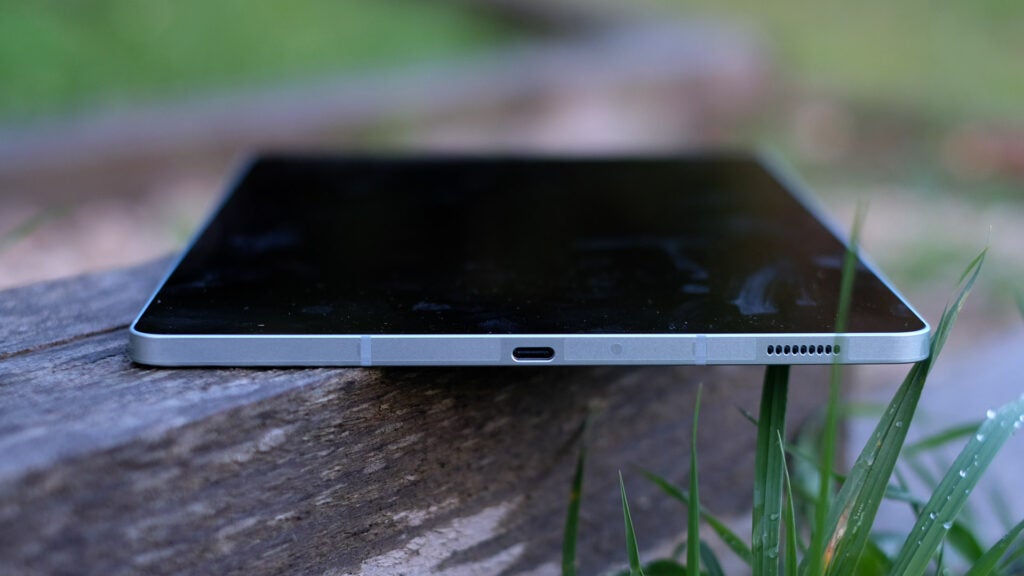
It takes the Tab S9 FE 43 minutes to reach 50%, and it gains 17-18% every 15 minutes right until you get to around 90%. After that, it slows down, and reaches 100% at 104 minutes. By contrast, OnePlus says its 67W charging fills up the OnePlus Pad’s larger 9510mAh battery in 80 minutes.
Still, they are both snappier to charge than an iPad.
You can expect the battery to last around eight hours of lighter gaming, or 11 hours of video streaming. It’s likely to last longer with video stored locally on its memory.
Should you buy it?
If you’re here for digital artwork
The Tab S9 FE includes a pressure-sensitive stylus that will cost you a good chunk of the tablet’s own cost to get from Apple or OnePlus, which is key to the sense of value on offer here.
If you’re a major gamer or tech-head
For similar money, you can get a lot more power from the OnePlus Pad or the most affordable iPad lines. With more than double the graphics power than this tablet, the Tab S9 FE is not the obvious pick for performance heads.
Final Thoughts
The Samsung Galaxy Tab S9 FE is a solid mid-tier tablet that mostly makes the right cuts from the non-FE range in order to shave hundreds off the cost.
Among its competitors, it stands out as a tablet that includes a great stylus at no extra cost, making it of instant appeal for those who want to dabble in digital art.
The base iPad and OnePlus Pad are both better picks for gaming, though, as they have significantly more power. Just like the Samsung Galaxy Tab S6 Lite, the S9 FE only has enough power to get by.
FAQs
It is highly water resistant, with the IP68 rating suggesting it can take full submersion in water.
There’s no headphone jack, so you’ll have to use wireless headphones or a USB-C adapter.
There’s no power supply, just a USB-C cable, the tablet and the S-Pen stylus.


